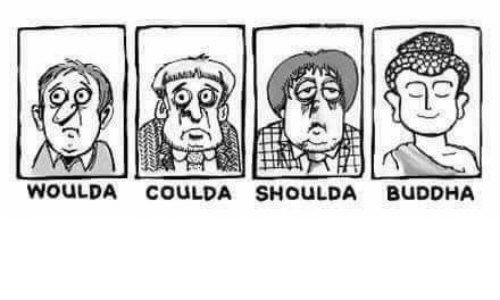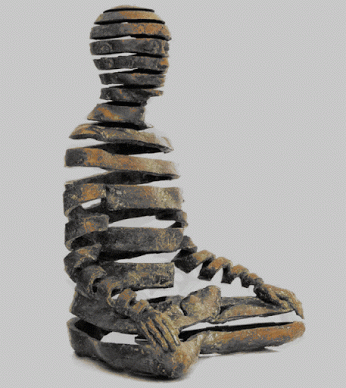Making sacrifices
 Jeroen
Luminous beings are we, not this crude matterNetherlands Veteran
Jeroen
Luminous beings are we, not this crude matterNetherlands Veteran
Have you ever decided to make a serious sacrifice for a deeply-held principle, or discussed with other people your decision?
I decided around age 16 not to have any children, because of what humans were doing to the planet. It’s been one of the things that’s been responsible for me not getting married or having a long-term partner. I’ve never really discussed this with other people, it’s like I held it close within myself for many years, and I find it difficult to put a finger on the reason why.
Also I have had long periods of being vegetarian or pescatarian, not driving a car, walking and cycling places, travelling by train, living simply. All for the same reasons, although they haven’t impacted my life as much. When I was young I came across this American Indian saying, “touch the world lightly when you walk on it”, and i’ve tried to live by that.
But I’ve always felt a great kinship for the dolphins and whales and seals and penguins, and i have felt it was a crime against the natural world to do all the things we humans do — open cast mining, logging, clearing the wilderness, unsustainable hunting and fishing. We drive to extinction all kinds of species great and small, and put a huge stress on the life on Earth. I don’t think it is right to do any of that.
If you were to ask me why I don’t discuss these things I couldn’t say... anyway it just kind of came out today, and I thought it might be interesting to discuss the process of making sacrifices. It’s not something that is very popular today. In the past when a king or a chief or a man of wealth died, they would be buried with some of their treasures. Today in China they use paper representations of real things, a paper mansion to live in and (fake) paper money to spend.
Perhaps there is a Buddhist point of view... monastics make many serious sacrifices for their convictions.


Comments
I have a child with special needs.
I’ve made a lot of sacrifices for her and will continue to do so. Probably for the rest of my life.
Hmm it sounds similar to Renunciation
Most broadly, renunciation can be understood as a letting go of whatever binds us to ignorance and suffering.
I have sacrificed the need to discuss sacrificing
However here is a list of my good deeds:
Basically I discuss my virtue but it does me no favours ... 🥳🙊👍🏻✅
In a way I think many people in modern society have forgotten what it’s like to make sacrifices, and so people who do so are no longer praised for it.
I was a bit shocked to discover this about myself...
I am unsure, have I based my life on these principles in vain? Should I have lived a different, less extreme kind of life? It feels strange to be asking these questions of myself or others...
Where you are at now is where you are meant to be....

Thanks @shoshin....
I’ve felt a strong conviction for a long time about the forests and wildlife, and when I read about Greta Thunberg’s speech to the UN, I feel like cheering her on. Go Greta!
There too they talk about sacrifice, doing things that are not easy but right.
There is an organised force of Climate Change deniers which is actively, globally doing whatever it can to undermine, ridicule and discredit her.
They're using every trick in the book, and all of them below contempt, to attack her in any way they can - in the press and via social media.
There is a small core of women, who right now are making a massive difference' politically, medically, environmentally. And they are all under an organised system of attack, by men, who are frankly, running scared.
The reason a cornered injured dog will attack you, even if you are trying to help it, is not because it believes you to be hostile. It attacks because it's scared for its own existence.
There, the similarity between these men, and this dog, ends.
Because the dog is doing it out of GENUINE ignorance.
These men have no such justification.
They are scared for their own existence because they perceive this survival and advancement of women as a threat to their power, wealth, position and authority.
Greta Thunberg is both a woman, and a child. When a pack hunt, they target the weak and helpless. This is what they perceive her to be, so they undermine the very qualities that make her stand out as someone uniquely special.
This pack has picked the wrong target.
It depends on how you look at it. I abide by deeply held principals, like veganism for various reasons, but I don't consider it to be any kind of sacrifice but just an appropriate way to behave.
Since you made this post I've given a fair bit of thought to the question. What does it mean to make a sacrifice? To what extent do I make sacrifices in my life?
In that sense I do sacrifice quite a bit in my life. I sacrifice eating cookies everyday for the greater benefit of a healthy body. I sacrifice time in front of the computer to meditate. But I'm not sure these are really sacrifices so much as they are simply choices. Many choices mean giving up one thing for another.
Those are simple examples with obvious trade offs. Since I was young I would often speak the truth, as I saw it, rather than preserving social niceties, unintentionally sacrificing relationships. These days I have a more conscious understanding of the costs of being disagreeable or not conforming to group norms, but I still will speak a truth, though I've become more diplomatic, and hold to certain convictions rather than conform. So I think that counts as sacrificing the opportunity to belong for, what is in my mind, the greater cause of truth and personal integrity. For me though I think it would be a greater sacrifice to give up the latter for the former. So maybe it could also be seen as more of a choice.
And in light of @adamcrossley 's post on giving maybe much of what we might consider sacrifices are more just a lack of a deep enough perspective on what brings benefit and what doesn't. I might consider something sacrificial rather than the better choice if I don't fully appreciate the benefit of doing so.
On another note, I also often look for win-win solutions in my life or places where there are opportunities for larger impacts for minimal sacrifice. Take my own use of plastics, since that's an area of focus here. I reduce and recycle when it doesn't take extraordinary efforts, but I don't go too far out of my way so I still use plastic a decent amount. Just the other day I realized that without making strong efforts I have reduced the amount of plastic I use by at least 100 pounds, if not more. Officially mandated practices for working on a home with lead paint calls for protecting the area with a 20 foot wide sheet of 6 mil plastic (heavy duty professional trash bags are 3 mil) and wrapping up and disposing of it after use. Doing it that way prevents pretty much all lead dust and scraps from getting out into the area, but has always seemed excessively wasteful to me. So instead I use one of those large blue tarps and transfer the waste from there and keep reusing that. I still collect probably 99% of the debris but avoid using large amount of plastic, but if some hard nose inspector saw me I could be fined.
My point is that by optimizing our sacrifices for opportunities that allow for larger rewards with minimal efforts we can still do plenty of good without major sacrifices. To get philosophical, there are 3 major ways of understanding ethics. Virtue ethics, developing personal qualities such that your natural inclinations are to be virtuous (you care about the environmental impact plastics, so you'll be inclined to do the right thing). Consequentialism, ethical choices are determined by outcomes (my example above). And deontology, there are proper and correct choices that you ought to do because the actions in themselves are correct (its good in itself to be conscious about your plastic usage).
Personally I follow the first two, virtue ethics and consquentialism, as guides for my life but am not very moved by the third. I care about caring and I care about the real world overall consequences of my actions, but don't give merits or demerits for adhering to particular moral codes.
Speaking the unpleasant truths and sacrificing the easy path in relationships is a well-chosen example @person, I think that will resonate with a few people here.
I have to say, your post speaks of a very rational consideration, which I find contrasts with my own more emotional view. It’s something that I have been looking at over the past couple of days, a liking for comfort and emotional thinking. I believe it stands in the way of clarity. Thank you for helping to clear the mental fog.
I would just say that feel like I act in the world in a rather intuitive manner, but I've come to recognize over the years that intuitions and emotions can often be biased and misleading. So I have made a point to "show my work" as it were to see if there are flaws or improvements that can be made. Like a math problem, maybe you are able to look at it and know the answer, but there is value in being able to work out the details in that it will help you solve other problems (understand why you feel what you feel) and communicate the answer with others.
Intuition is not emotional. In a sense emotion clouds it. Rationality or sacrificial thinking is letting our 'independent thinking' subside or be sacrificed.
As we focus on the needs of the situation, we serve by sacrificing to its requirements. So in this sense we bring and resonate with our best being/understanding.
As knowing through the various means and practices increases, we wish to give up more to what was once a rose or lotus bud, ever unfolding ...
Great line. Sacrificing ourselves to the needs of the situation.
When push comes to shove.... there's really nothing to sacrifice... well except the illusion....


Think about it
Apparently “sacrifice” is derived from the Latin word sacrificō which is made of two parts: sacer meaning “holy”, and faciō meaning “to make”. After all, the original “sacrifices” were offered to the gods. Just thought I’d add this to the thread.
Terence McKenna making some sense...
In my mind love and sacrifice go together. And humans, being moral agents, must sacrifice out of this conviction of love....
As Swami Abhishiktananda writes:
‘The essential awakening to being in the depth of the soul does not depend either on knowledge or on discipline of the will. Only God can bring it about. The only way to it is that of love – love which releases man from the limitations of his ego, and throws him into the arms of God and his brothers;love which is as strong as death (Song of Sol. 8:6), that death which, in God’s wise design, is the only road to life.’
I feel a little (well, a lot.. tbh) hypocritical when writing this, because, even though I agree with it, my life has not been very sacrificial... but I'm trying to change that. One day I will know the true depths of selfless love, in giving myself away......
Voltaire once said "If God didn't exist, it would be necessary for Man to invent him".
Personally, I'm of the opinion that's exactly what we did.
God doesn't really figure in my consciousness, at all. And that's from an ex-R.Catholic of over 40 years' intense standing....
I suppose I am being a tad too theistic given this is a Buddhist forum. But these are my insights at least. I'll try to focus more on Buddhism proper.
No, I was just giving my opinion. This is a discussion forum and you are just as entitled to air your opinion as anyone else is. Please don't take my comment as any form of censorial indication. I don't do that.
When we surrender our choice, we sacrifice. when we give our power to others, surrender our power to others, we sacrifice. When we make decisions based upon our own power, there is no sacrifice. When the decision to take one action vs another, that is not sacrifice. we choose our path, we choose the actions we take. we choose to accept this and set aside that. We choose to stand up or sit down. We choose the trails, the paths we travel. Only when we allow others to choose our trail, our path, only then do we sacrifice.
Peace to all
So, @Lionduck, how would you differentiate between sacrifice and surrender? Because see, would consider your examples those of surrender, but not necessarily sacrifice.
That depends upon how the term :surrender" is used.
when, say, you choose to "surrender" to the moment and blend as one with nature, you have not surrenders your separateness. You have made the choice to blend your separateness with the unity of the nature you behold in that moment that "surrender" is not surrender you have sacrificed nothing and gained a priceless moment.
On the other hand, when you yield your power to decide what and how you will view, respond or react to the moment, you have sacrificed your power, your "self" to another. You have sacrificed your power of choice to the whims of a different self, not your own. You may gain some benefit but you have gained it at the cost of each such moment. you must now get permission of the other to even attempt to find oneness with nature or yourself or even, truely, with others. that is SACRIFICE.
The Buddha was a guide, a teacher. He compelled no one to walk with him, He was not a Master, but a Mentor. He did not command - He guided. he strove to make all his equal, to enable everyone to be, himself or herself, Buddha.
Peace to all